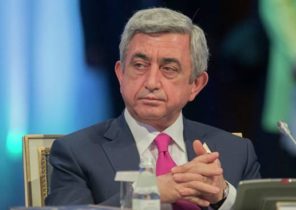
Donald trump just received the last order from Vladimir Putin — if the person that came to mind after a telephone conversation on Sunday, he could be forgiven, considering how recently heard some of the headlines: “the Emerging similarities between Putin and the tramp” (The Budding Resemblance Between Putin and Trump), “Male friendship Putin, trump makes Americans Pro-Russian” (Trump’s Putin Bromance Is Making Americans Pro-Russian), and “As trump likes to Putin?” (How Much Does Trump Love Putin?).
Because of the politicization of Russian influence, unfortunately, creates a misconception, like how Russia is threatening American interests. The American people should take a moment to think about whether he is afraid of Russia. This is important because a wrong perception is fraught with very serious consequences, fear can divert attention from other, more serious threats, to limit the geo-strategic agility and cause potential conflicts in the future.
If a quick look at the headlines, it can be concluded that Russia is the main villain, the main foreign enemy of the United States. Proof that Russia is a threat to the national security of the United States become a hacker attack on the servers of the national Committee of the democratic party last year. And the feeling of this threat came not from the beginning of last year, the authorities are investigating Russia’s intervention in American politics, especially its support of the campaign trump.
It is not surprising that Russia is very suspicious of politics are leftist. During women’s marches and the subsequent demonstrations, the protesters brandished various placards with inscriptions, according to which trump is a puppet of Putin. “Shine, Shine, a little kinglet, Putin made you who you are” (changed the words from English lullaby based on a poem English poet of the nineteenth century Jane Taylor “The Star” — approx. transl.). “Say no to Putin puppet!”.
In fact, the essence is that although Russia is a threat, this threat is considerably exaggerated by the war of compromising materials in the course of the political struggle in the United States.
Take a look at the events of mid-2016. Already then it became clear (to the dismay of Democrats) that trump can actually win the election. One of the main tools that used trump to get around Hillary Clinton, was its rhetoric in the spirit of “America first”. As he said, Hillary and the Obama administration, where she worked, gave rise to ISIS (an organization banned in Russia — approx. ed.) were the perpetrators of the attacks on Benghazi, has allowed China to use the United States to their advantage and were made to immigrants from Latin America damaged the us economy. In addition, trump blamed Clinton that she is under the influence of foreign companies and countries levavcha funds to the Clinton Foundation. These statements have convinced many Americans that trump is the person who will protect the country in a situation when the world is becoming more dangerous.
The truth was that Russia’s intervention in American politics was called at that time a growing concern. Although the national Committee of the democratic party until mid June never really talked about hacker attacks, involving Russia, the Democrats knew about this for months. Putin has already shown that he prefers not Hillary and trump.
Quite naturally for a politician of her level, Hilary realized that dark when trump with Russia provide fertile ground for discussion. During the first debate, she perfectly used this material: “now there is no doubt that Russia used cyber attacks against various organizations of our country, and I am extremely concerned. I know that Donald is very worthy of the praise of Vladimir Putin.”
She presented Russia as a threat, making it clear that Moscow cunningly uses trump as a “Manchurian candidate” of the XXI century. When Hillary did it, there was an awkward, unpleasant feeling. Roughly speaking, it is understood that xenophobia is a salable commodity.
Why is all this so important? Because it means that the society and state authorities, analyzing threats to national security (remember that the members of these organizations are also part of this society), too fixated on Russia, and this is the result of not quite sober analysis. Election propaganda work, funny memes and many conspiracy theories have done their job — people are too convinced of the seriousness of the Russian threat.
Excessive fear of Russia is a problem for three reasons. First, this fear is dangerous because it serves as a distraction. Because of this obsession that gripped society may be a redistribution of scarce public resources, and they can be directed against a threat that only seems important, not to identify other threats. The reallocation of resources is happening right now — as evidenced by the recent decision of the special Committee on intelligence of the house of representatives to learn Russia’s influence on elections.
Although Russia represents for US a serious threat in terms of espionage, this threat is just one of the many problems in the field of national security. Too much effort, which public authorities shall take in order not to miss hacker attacks may prevent them from detecting other threats. In the history there were cases when such “cognitive distortions” lead to negative consequences. For example, in the 1980-ies, when even lasted the cold war, and the Soviet Union presented to the United States primary foreign policy threat, the American spy Jonathan Pollard (Jonathan Pollard) was spying against the United States in favor of Israel, their ally. He was sentenced to life imprisonment, but only after five years of espionage.
Second, the hostile attitude of the public USA to Russia limits the ability of Washington when choosing a flexible approach to Moscow. It is in this was a trap Barack Obama: when will Russia begin to take a dangerous opponent, it becomes difficult to communicate when the United States such cooperation is most needed.
The escalation of tensions in relations with Russia prevents the US from acting effectively in various fields. If Washington plans to stabilize the situation in Venezuela or to understand the actions of China in the South China sea, it is better to approach Russia as a potential partner. Russia has a unique opportunity — it is able to prevent the actions of the United States in many parts of the world, and it is constantly and consistently oppose U.S. initiatives to achieve the ability to sit down at the negotiating table.
And finally, fear can be a catalyst for war, although at present this seems unlikely. Because of his fear of the Americans forget that in Russia there are many people just as they are. Leaders causing fear — like Putin — believe dangerous monsters, and similar cognitive abnormalities, such bias distorts the perception of threat and have a negative impact on the process of strategic decision-making. Remember the September 11 attacks? Remember irrational connection between “al-Qaeda” and Saddam Hussein? Remember the uranium concentrate, which served as the basis, proof that the United States should act?
Of course, there are several factors due to which the possibility of full-scale conflict between USA and Russia in the near future is limited. One important factor is that trump, it seems, does not pay attention to those feelings in relation to Russia, the public and even Congress. Another factor is that Russia appreciates the relations between the two countries in trump with cautious optimism. Despite this, we should not forget that the antagonism still increases the likelihood of a possible conflict. Judging by the disagreements with China on the issue of Maritime sovereignty in Asia, the harder dialogue becomes even more explosive confrontation.
In the United States too much attention to specific foreign enemies quickly arises and passes — often for unknown reasons. Why is the main threat to national security was Iraq, China, and now Russia? Why the American public no longer pays attention to Iran and North Korea? Why so little concerted action was undertaken to address threats that exist much closer to us — for example, transnational criminal gangs in Central America, or the threat of the collapse of Venezuela? The fact that the fixation of the public on the threat variable, unpredictable, and mostly is a reaction to the circumstances. In addition, it often takes a distorted shape under the influence of debate within the country by these threats to do with.
The American public has every right to fear Russia and to call it a threat to national security. But before that, it would be better to think about.
Nicholas Borroz works in Washington, DC consultant on strategic security issues. Provides consulting services on issues of reputational, legal and political risks in emerging markets. Publishes articles in the publications of the New York Times, Nikkei Asian Review, Foreign Policy, War on the Rocks, etc. he Graduated from the School of advanced international studies Johns Hopkins University has a master’s degree in international Economics.







